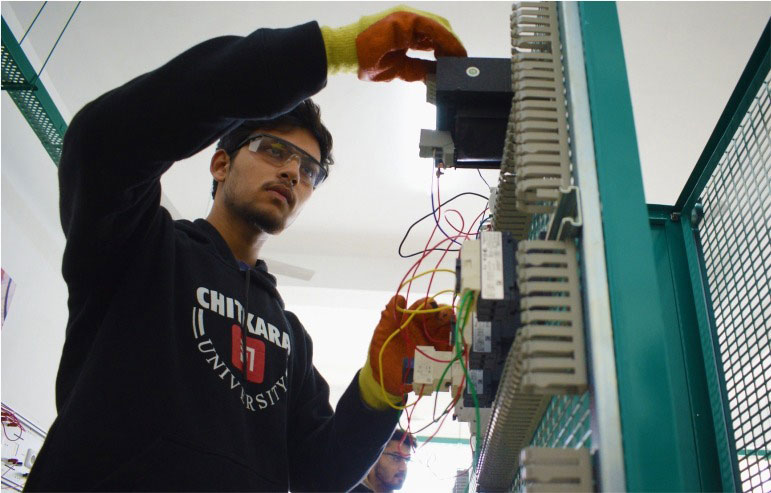Consider how boring and difficult life would be without power and household appliances like a microwave, refrigerator, and television. Is it not? We now consider electricity and electronic equipment to be necessities of daily life.
The scope of electrical and electronics engineering has expanded dramatically during earlier decades as a result of our growing reliance on electrical and electronic devices. To fulfil the diverse demands of customers in India and overseas, the employment rate in the many branches of electrical and electronics engineering is constantly rising. Electrical and electronics engineering courses offered in top colleges such as Chitkara University is essential in all environments, including those involving transportation, finance, other corporate and governmental sectors, and even educational facilities.
Also Read: Future Scope Of Bachelor Of Engineering In Electrical Vehicles
More About Electrical Engineering
One of the most popular fields of study for engineering students is electrical engineering, which focuses on the practical uses of electricity and electronics
The electric light bulb, radio, and induction motors—all firsts in electrical engineering—were invented by Thomas Alva Edison, Nicola Tesla, and Guglielmo Marconi. These creative individuals changed the situation by putting the idea of electrical engineering into useful tools. Power generation and transmission systems, motors, batteries, and control systems are included in the specialist areas of EE.
How is it different from Electronics Engineering
The study of electronic apparatus, circuits, tools, and systems is central to electronics engineering. Students who study electronics engineering get knowledge on how to use a variety of electronic parts, including microcontrollers, microprocessors, and programmable logic devices. The following are the main subfields of electronic engineering:
- Digital electronics
- Digitized electronics
- Electronic power
- Electronic Systems
- Systems for Communications
Engineering disciplines such as electrical and electronics are interrelated. However, because these two technologies complement one another, the majority of engineering UG and PG courses group them together. The three main courses offered at engineering universities are B.Tech in Electrical and Electronics Engineering, B.E in Electrical and Electronics Engineering, and M.Tech in Electrical and Electronics Engineering. The tasks carried out in each of the two specialities can be used to separate electrical engineering from electronics engineering.
Also Read: What Can You Do With An Electrical Engineering Degree?
Growing Scope of Electrical Engineering in India
The Ministry of Heavy Industries and Public Enterprises’ programme, “Vision 2022 for Indian Electrical Equipment Industry,” has expanded the field of electrical and electronics engineering in India. While the T&D equipment category is predicted to reach a value of Rs. 375,000 crores, the growth of the generating equipment segment may reach up to Rs. 125,000 crores. On the other hand, the contribution of Indian electrical engineering to worldwide EE commerce, which is presently hovering at 0.8%, will increase to 2% by 2022. The rate of import is also anticipated to drop by 7-8% as a result of ongoing developments in Indian electrical engineering.
According to the aforementioned statistics, the Indian EE Ecosystem is progressing as planned, and its potential is expected to grow daily. There would be 1.5 million electrical engineers hired directly and 2 million indirectly, according to the Vision 2022 study, in terms of career prospects. This project or vision is centred on the goals and potential of the Indian electrical equipment sector.
Also Read: 10 Advices To Consider Before Studying Computer Science Engineering
Promising Job Opportunities for B.Tech Electrical Engineering Graduates in India
In India, there are now over 2,00,000 electrical engineers working in various businesses. Electronics engineers, on the other hand, have filled around 150,000 employment openings in India. 136,300 people work as electronics engineers, excluding computer engineers.
According to the Bureau of Labour Statistics report, every other industry will experience employment growth faster than the predicted 7% annual rate for the electrical and electronics sector. Additionally, it demonstrates the broad extent of the global electrical and electronics engineering sector. The government’s flagship programmes in India have sparked interest in the electrical and electronic sector, which is excellent news for engineers looking for employment possibilities in the near future.
Electrical and electronics experts are expected to increase in number significantly in the main sectors. Companies are required to undertake duties like producing electrical and electronic gadgets and components exclusively with the help of trained engineers. This suggests that engineers will be in demand for a very long time.
The number of electrical and electronics engineers employed in 2016 will increase by 7% to 345,800 by 2026, according to predictions for career possibilities. Therefore, there would be 21,200 more job openings overall. If we solely talk about electrical engineers, there were 188,300 positions in that field in 2016; by 2026, that number will rise by 9%, or 16,200 jobs. On the other hand, 136,300 electronics engineers (apart from computer engineers) were employed in total in 2016. It will rise by 4%, and the corresponding industries will gain 5,100 new job opportunities.
Also Read: 7 Doubts You Should Clarify About Computer Science Engineering Course
In Conclusion
If you’re not sure which university is the greatest for electrical engineering, Chitkara University is a fantastic choice. It is a leading electrical engineering university in India. The Institute’s best characteristic is that several large MNCs, who routinely visit campus for placements, have accredited it.






